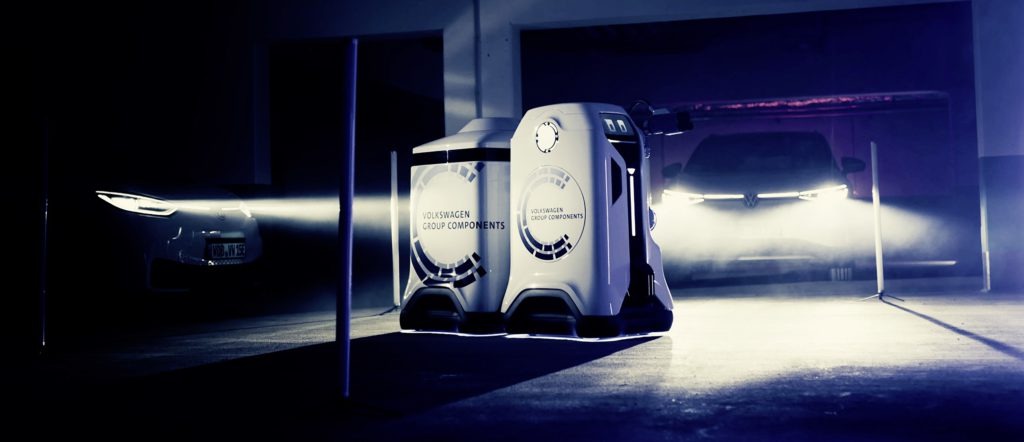VW unveils robotic charging as it increases infrastructure
04 January 2021

4 January 2021
Volkswagen Group (VW) has offered a glimpse of its prototype mobile-charging robot. Announced early last year, the robot provides fully-autonomous charging solutions in restricted-parking areas, such as underground car parks.
With sales of electric vehicles expected to grow even further throughout Europe this year, and manufacturers continue to launch new models, charging infrastructure across the continent is in need of expansion. Carmakers are likely to lead the way, and VW’s robotic solution will aid this development, bringing the charging point to the vehicle and therefore increasing the number of potential charging locations.
′Setting up an efficient charging infrastructure for the future is a central task that challenges the entire sector,’ said Thomas Schmall, CEO of Volkswagen Group Components. ′We are developing solutions to help avoid costly stand-alone measures. The mobile-charging robot and our flexible quick-charging station are just two of these solutions.’
The device, started via an app or Car-to-X communication, operates autonomously. It independently moves to the vehicle to be charged and communicates with it: from opening the charging-socket flap to connecting the plug and decoupling it. The entire charging process takes place without any human involvement.
To charge several vehicles at the same time, the mobile robot moves a portable energy-storage unit to the car, connects it up and then uses this to charge the battery. The unit stays with the vehicle during the charging process. In the meantime, the robot charges other electric vehicles. Once the service has ended, the robot independently collects the mobile energy-storage unit and takes it back to a central-charging station.
New infrastructure
Meanwhile, the VW brand is to significantly expand the charging infrastructure at its German sites, providing points for use by both staff and the public.
Around 750 new chargers will be installed at factories and offices over the next 12 months, including its first high-power charging stations, which provide up to 300kW of power. This would give the carmaker over 2,000 charging points at its facilities. Currently, VW has 1,200 points available to both staff and the public.
Providing points for staff will help increase Germany’s charging infrastructure while also helping the manufacturer achieve environmental goals. VW, the first carmaker to commit to the Paris Agreement, aims to become climate neutral by 2050 and currently has 500 charging points in Wolfsburg, with further charging parks installed in Hanover, Brunswick, Salzgitter, Kassel, Emden, OsnabrÜck, Zwickau, Chemnitz and Dresden.
During 2020, Volkswagen recorded over 50,000 charging operations at its sites, despite the impact of COVID-19 meaning many staff and commuters remained at home. As part of its sustainability drive, the power comes exclusively from renewable-energy sources.
′Volkswagen is making an important contribution to the urgently-needed expansion of the charging infrastructure,’ commented Thomas Ulbrich, member of the board of management of the Volkswagen Brand responsible for e-mobility. ′We need significantly more charging points in Germany and Europe if electric vehicles are to establish themselves quickly. For that reason, all players from the fields of politics and industry must continue their efforts in the coming year.’
Committed player
The increase in charging points this year is part of a larger offensive, with VW aiming to have 4,000 points installed at its sites by 2025. Volkswagen dealers are also expanding their charging options. In future, every Volkswagen dealer in Germany will provide at least one AC charger with 11kW of power and one DC charger with 22kW.
The carmaker also offers proprietary wallboxes, charging services and green power tariffs via its subsidiary Elli. In Germany, demand is driven by the incentive programme for private charging stations, which offers a €900 bonus for the purchase of connected wallboxes.
Volkswagen is also part of the charging station network Ionity, which is planning to expand the public charging infrastructure across Europe with the backing of several vehicle manufacturers.